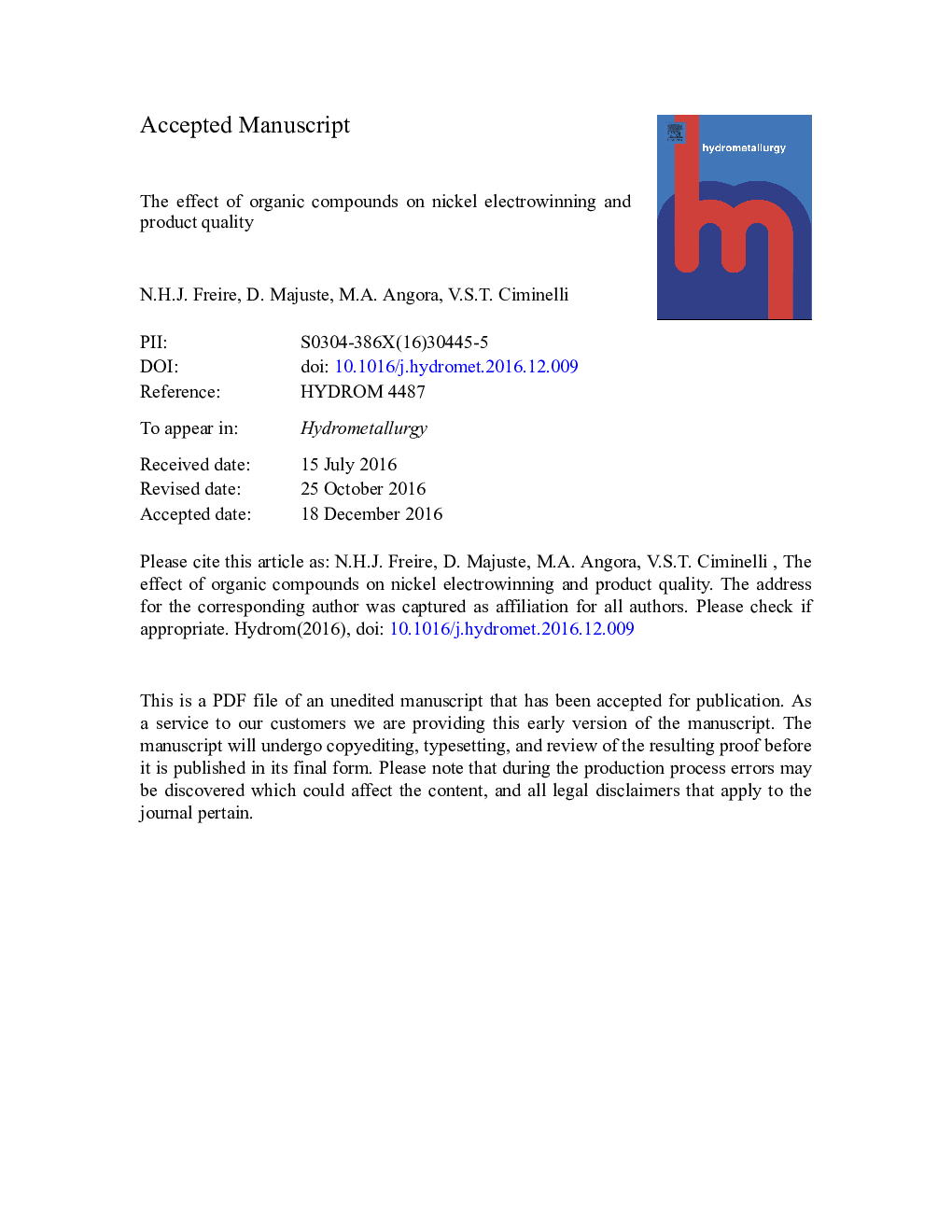| کد مقاله | کد نشریه | سال انتشار | مقاله انگلیسی | نسخه تمام متن |
|---|---|---|---|---|
| 4769317 | 1425535 | 2017 | 50 صفحه PDF | دانلود رایگان |
عنوان انگلیسی مقاله ISI
The effect of organic impurities and additive on nickel electrowinning and product quality
ترجمه فارسی عنوان
اثر ناخالصی های آلی و افزودنی بر روی الکترود نیکل و کیفیت محصول
دانلود مقاله + سفارش ترجمه
دانلود مقاله ISI انگلیسی
رایگان برای ایرانیان
کلمات کلیدی
موضوعات مرتبط
مهندسی و علوم پایه
مهندسی شیمی
مهندسی شیمی (عمومی)
چکیده انگلیسی
The present work describes the effects of certain organic compounds used in industrial operations on nickel electrowinning and product quality. The organic compounds tested here consisted of a commercial extractant (Cyanex 272), a diluent (Escaid 110), a flocculant (Flonex 910), a lubricating oil (Lubrax Hydra 68), and an acid mist suppressant (Fluorad FC-1100). The electrowinning experiments were conducted under operating conditions (i.e. nickel concentration, pH, temperature, and current density) commonly applied in industries. The results indicated that the extractant, the diluent, and the lubricating oil do not affect the current efficiency (CE) or cell voltage (CV) at levels 0-100 mg Lâ 1, while the flocculant and acid mist suppressant caused negative impacts on the electrowinning process. The CE dropped from 93.6% (organic-free electrolyte) to 86.0% and 92.8% in electrolytes containing 100 mg Lâ 1 of acid mist suppressant and flocculant, respectively. Measurements by cyclic voltammetry showed that Ni2 + reduction starts at more negative potentials in the presence of the flocculant and the acid mist suppressant, thereby indicating an inhibition of the deposition reaction. Regarding the deposit quality, all organic compounds (except diluent) increased hydrogen pitting at 100 mg Lâ 1. The addition of the acid mist suppressant showed the most negative impact, resulting in the delamination of the Ni deposit at 50 and 100 mg Lâ 1, likely due to a decrease in the crystallite size. Metallographic analysis indicated that the type of deposit microstructure was modified when the electrolyte contained the flocculant and acid mist suppressant. As regards the effect on the Ni deposit's nanohardness, the measurements indicated that the flocculant and the acid mist suppressant, at 100 mg Lâ 1, strongly increased nanohardness by approximately 31% and 72%, respectively. This increase in nanohardness consequently decreased the material's ductility, which may affect the stripping and cutting of the Ni sheets.
ناشر
Database: Elsevier - ScienceDirect (ساینس دایرکت)
Journal: Hydrometallurgy - Volume 169, May 2017, Pages 112-123
Journal: Hydrometallurgy - Volume 169, May 2017, Pages 112-123
نویسندگان
N.H.J. Freire, D. Majuste, M.A. Angora, V.S.T. Ciminelli,
